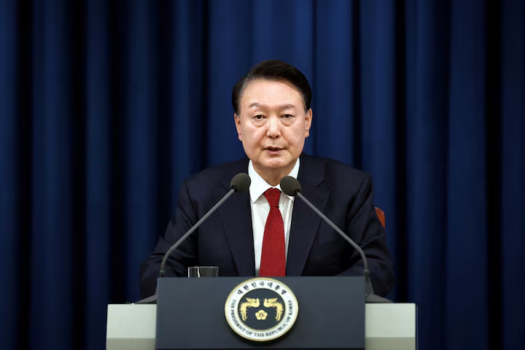 South Korean President Yoon Suk Yeol issued a public apology on Saturday following his controversial declaration of martial law earlier in the week. The move, which he later rescinded under parliamentary pressure, caused widespread public anxiety and led to calls for his impeachment.
South Korean President Yoon Suk Yeol issued a public apology on Saturday following his controversial declaration of martial law earlier in the week. The move, which he later rescinded under parliamentary pressure, caused widespread public anxiety and led to calls for his impeachment.
In a televised address, Yoon said, “The declaration of martial law was made out of desperation, but it caused anxiety and inconveniences to the public. I deeply regret this and apologize to the people who must have been shocked.” He pledged not to attempt martial law again and left decisions about his term to his party.
The National Assembly, controlled by opposition parties, is set to vote Saturday afternoon on an impeachment motion against Yoon. The opposition holds 192 of the 300 seats and requires at least eight votes from Yoon’s conservative People Power Party (PPP) to secure the two-thirds majority needed for impeachment.
The controversy began Tuesday night when Yoon declared martial law, citing the need to confront what he described as “anti-state forces” in parliament. Special forces surrounded the National Assembly, and military helicopters hovered overhead. The martial law order was overturned hours later by a unanimous parliamentary vote, forcing Yoon to withdraw the decree.
The declaration marked South Korea’s first martial law in over 40 years and sparked nationwide protests. Demonstrators in Seoul have called for Yoon’s resignation, while smaller groups of his supporters rallied near the National Assembly to oppose impeachment.
Opposition leaders, including Democratic Party leader Lee Jae-myung, have labeled Yoon’s martial law attempt a “self-coup” and demanded his resignation or impeachment. “The only way forward is his immediate resignation,” Lee said.
Meanwhile, internal divisions within Yoon’s PPP are complicating the impeachment dynamics. Eighteen PPP lawmakers supported overturning martial law, but the party officially opposes impeachment. PPP chair Han Dong-hun, who leads a minority faction, has called for suspending Yoon’s constitutional powers, describing him as “unfit for office.”
Han revealed allegations that Yoon had ordered defense counterintelligence officials to detain key politicians, including opposition figures and Han himself, during the brief period of martial law. The Defense Ministry has since suspended several military commanders involved in enforcing the decree.
If impeached, Yoon’s powers will be suspended pending a Constitutional Court decision. A removal from office would trigger a presidential by-election within 60 days, potentially reshaping South Korea’s political landscape.
Parliament is scheduled to meet at 5 p.m. Saturday to vote on both the impeachment motion and a bill appointing a special prosecutor to investigate allegations of influence peddling involving Yoon’s wife.
Political experts caution that Yoon’s impeachment could leave the conservative bloc in disarray, paving the way for a liberal victory in a by-election. The unfolding crisis has also raised concerns among international allies, including Japan and the United States, about South Korea’s political stability.

White House Says Military Option Open On Greenland Acquisition
Trump Calls Case Against Maduro “Infallible” Ahead Of U.S. Court Appearance
South Africa Raids U.S. Refugee Processing Centre, Arrests Seven Kenyans
Time Magazine Names AI Visionaries ‘Person of the Year’